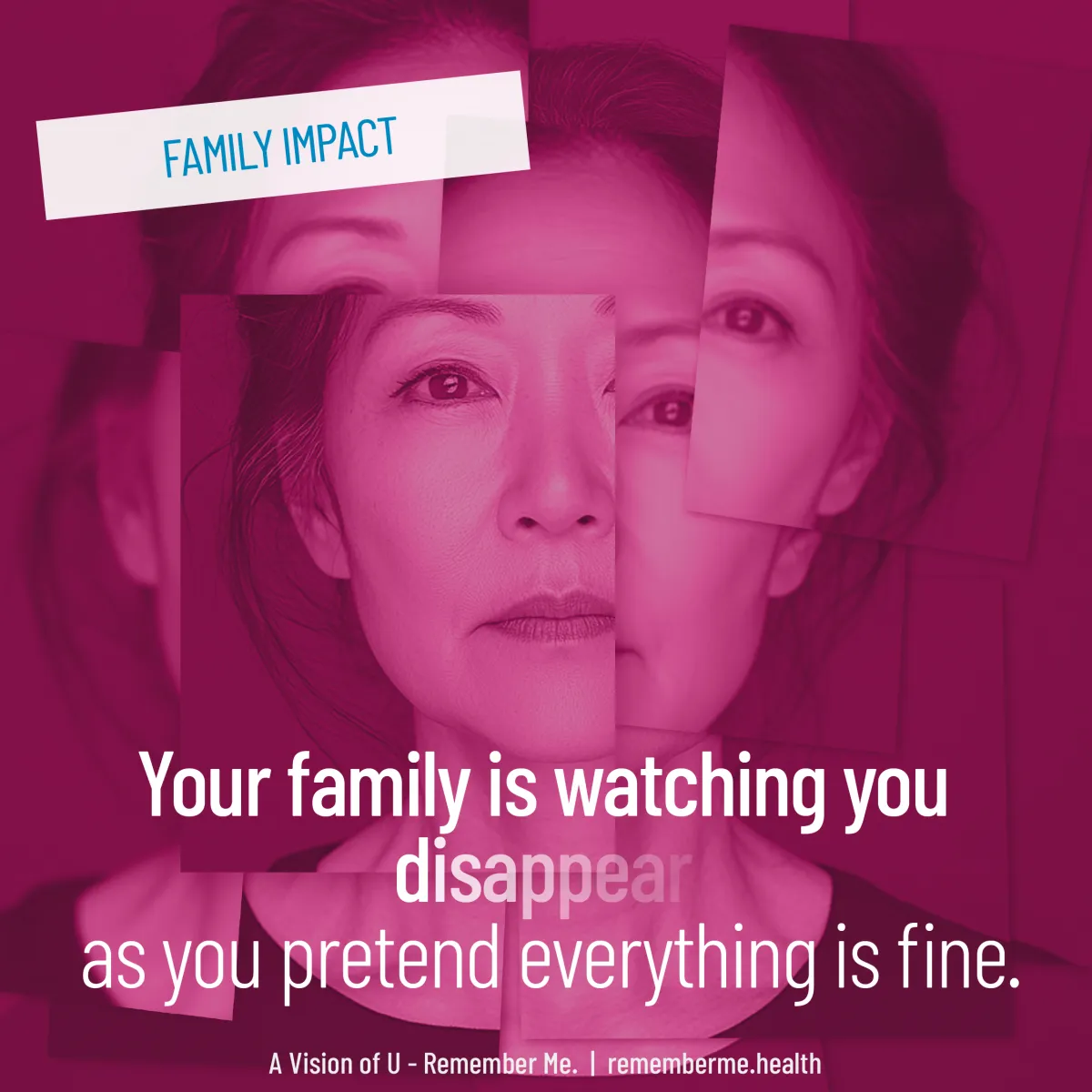
RESOURCES
Truth-telling resources designed to provoke, challenge, and inspire action.

STRAIGHT TALK
Unfiltered Truth About Cognitive Loss
No sugar-coating, no false hope, no empty platitudes. This is the honest conversation about cognitive loss that most people are afraid to have. If you want the truth—even when it's uncomfortable—this is where you'll find it.

FAMILY IMPACT
"Your family is watching you disappear and you're pretending everything's fine."
"The people who love you most are scared to tell you what they're seeing."
Your spouse notices you asking the same questions repeatedly. Your kids see you struggling with things that used to be easy. Your grandchildren watch you get confused during simple conversations. But you're so focused on appearing "normal" that you're missing the fear in their eyes. They're losing you gradually, and you're too proud to acknowledge it.
Have you asked your family what changes they've noticed?

MEMORY THEFT
"You're stealing memories from your grandchildren by not fighting for your mind."
"Every cognitive decline day is a memory your grandkids won't get to make with the real you."
Your grandchildren deserve a grandparent who remembers their stories, recognizes their achievements, and stays present for their milestones. But you're giving them a confused, forgetful, declining version of yourself. Future holidays, graduations, and precious moments will be tainted by your cognitive absence. You're robbing them of the grandparent they deserve.
Does this hit too close to home?

SPOUSE BURDEN
"Your spouse signed up for 'in sickness and health' - not 'in denial and excuses.'"
"Marriage vows include supporting each other through illness, not enabling cognitive decline through avoidance."
Your partner watches you make excuses instead of seeking help, avoid solutions instead of trying interventions. They want to support your health journey, not enable your denial journey. You're asking them to pretend your cognitive changes aren't happening while they watch the person they married slowly disappear. That's not fair to either of you.
Am I being too harsh about marriage responsibilities? How is your cognitive health affecting your most important relationship?

AGING EXCUSE
"Stop using your age as an excuse for what's actually neglect."
"Healthy 80-year-olds are sharper than unhealthy 50-year-olds. Age isn't the problem - choices are."
You blame your age for memory problems while making lifestyle choices that accelerate cognitive decline. Poor sleep, chronic stress, sedentary living, and junk food aren't "normal aging" - they're aging acceleration. You're using your birthday as permission to destroy your brain. Age is just a number; neglect is a choice.
Think I'm wrong about aging vs neglect? What's really causing your cognitive issues - your age or your choices?

SOCIAL MEDIA PRIORITY
"You have time to scroll for hours but no time to save your brain."
"Your screen time report shows exactly where your priorities are - and brain health isn't on the list."
Three hours of social media daily but "no time" for brain exercise. Two hours of streaming but "too busy" for learning new skills. Endless scrolling but "too tired" for memory training. Your phone knows exactly how you spend your time, and it's not on cognitive health. You're literally scrolling away your mental capacity.
Does this call-out make you defensive? How much time do you actually spend on screen time? Start keeping track.

EXCUSES VS. MEMORY
"Your excuses are weaker than your memory."
"You have more energy for making excuses than making changes. That's the problem."
Every excuse you create requires mental effort, creativity, and commitment. You're using cognitive resources to avoid cognitive improvement. If you put half the energy into brain health that you put into explaining why you can't do brain health, you'd already be recovered. Your excuse-making skills are stronger than your recovery efforts.
Does this call you out? What excuse did you just make reading this? What excuse do you use most often?

Cognitive bankruptcy
"You're cognitively bankrupt and still making poor investments."
"You're spending cognitive resources you don't have on activities that make you poorer."
Every mental shortcut, every avoided challenge, every comfort choice is a withdrawal from your cognitive account. You're already overdrawn, but you keep spending on brain-damaging habits while refusing to make deposits through learning, exercise, and challenge. You're mentally bankrupt but acting like you're cognitively wealthy.
Think this financial analogy is too harsh? Disagree with me in the comments. What cognitive investment will you make today to stop the bankruptcy?

brain neglect
"You maintain your car better than your brain."
"You change your oil every 3,000 miles but haven't changed your brain habits in 3,000 days."
Your car gets regular maintenance, quality fuel, and immediate attention when something's wrong. Your brain gets junk food, chronic stress, poor sleep, and excuses when it shows warning signs. You'll research the best mechanic for your car but won't research the best habits for your brain. You treat a replaceable machine better than your irreplaceable mind.
Does this comparison make you uncomfortable? When did you last "service" your brain with the same care you give your car?

future self betrayal
"Your future self will hate the choices you're making today."
"Every brain-damaging choice is theft from your future cognitive abilities."
Future you is counting on present you to protect their memory, thinking, and independence. But present you is choosing immediate comfort over long-term cognitive health. You're stealing from your future self's quality of life, relationships, and dignity. The person you'll be in 20 years is watching you destroy what they'll desperately need.
Think I'm being too dramatic about future consequences? What would 80-year-old you say about your current brain health choices?

intellegence waste
"You're wasting an intellect you'll never get back."
"Intelligence isn't infinite. You're burning through yours like it doesn't matter."
You were born with cognitive capacity that billions of people would kill for. But you're squandering it on mindless activities, avoiding challenges, choosing easy over growth. Every day you don't push your intellect, you lose a piece of it forever. You're treating a precious, finite resource like garbage.
Does this make you angry about wasted potential? What intellectual challenge are you avoiding because it's "too hard"?

decline acceleration
"You're not aging - you're accelerating cognitive decline."
"Normal aging doesn't include the brain damage you're creating through lifestyle choices."
Healthy brains age slowly and gracefully. Damaged brains decline rapidly and dramatically. You're not experiencing normal aging - you're experiencing lifestyle-induced cognitive acceleration. Every stress-filled day, every sleepless night, every processed meal speeds up the decline process. You're in the fast lane to cognitive failure.
Think normal aging includes what you're experiencing? Are you aging gracefully or declining rapidly?

effort avoidance
“Too lazy to save your own mind?”
"Brain health requires effort. You'd rather lose your mind than make an effort."
Cognitive recovery isn't complicated, but it requires consistent effort. Learning new skills, exercising regularly, eating properly, managing stress - these aren't impossible tasks. They're just more work than you want to do. You'd rather accept mental decline than put in mental effort. Laziness is literally costing you your mind.
Does calling you lazy make you defensive? What brain-healthy effort are you avoiding because it feels like work?

priority failure
"Your brain health is last on your priority list."
"You prioritize everything except the organ that makes priorities possible."
You have time for social media, streaming shows, and complaining about memory problems. You don't have time for brain exercise, learning, or cognitive challenges. Your priorities reveal what you value - and your brain isn't on the list. You're neglecting the CEO while obsessing over the trivial employees.
Think your priorities are fine as they are? Defend them below. Where does brain health actually rank on your priority list?

comfort zone death
Your comfort zone is a cognitive killer.”
"Comfort kills neurons. Challenge grows them."
Every time you choose easy over difficult, familiar over novel, comfort over growth, you're telling your brain to shut down. Neuroplasticity requires discomfort, learning requires struggle, growth requires challenge. Your comfortable life is creating an uncomfortable future of cognitive decline. Comfort today equals confusion tomorrow.
Does this make you uncomfortable? Good - that means it's working.

denial delusion
"Your denial is stronger than your memory."
"You remember every excuse but forget every warning sign."
You can recall every reason why your memory problems aren't serious, but you can't remember what you had for lunch. You remember every justification for avoiding help, but forget important appointments. Your denial system works perfectly while your memory system fails. You've optimized the wrong cognitive function.
Does this hit too close to home? Are your memory issues NOT that serious? What warning sign are you currently denying?

TECHNOLOGY CRUTCH
"Your phone is smarter than you are."
"You've outsourced your intelligence to a device that's making you dumber."
Your phone remembers numbers, navigates routes, makes calculations, stores information, and makes decisions. You remember nothing, navigate nowhere, calculate poorly, store little, and decide slowly. You've created a cognitive dependency so complete that you're intellectually inferior to the device in your pocket. Technology advancement equals your mental retreat.
Think this tech dependency comparison is unfair? Defend your smartphone relationship. How much intelligence have you surrendered to technology?

action paralysis
"You're paralyzed by planning and crippled by thinking."
"You overthink every solution and under-act on every opportunity."
You spend more time researching brain health than actually doing brain health. You read about exercise but don't exercise. You study nutrition but don't change your diet. You understand the problem but avoid the solution. Analysis paralysis is another form of cognitive decline - you're thinking yourself out of taking action.
Does this describe your approach to brain health? What brain health action have you been researching instead of doing?

wake-up call
"Your brain is sending SOS signals and you're hitting snooze."
"Emergency alerts from your brain are being treated like minor inconveniences."
Memory lapses, attention problems, word-finding difficulties, decision fatigue - these aren't quirks, they're distress signals. Your brain is literally screaming for help while you make jokes, create nicknames, and postpone action. You're sleeping through your own cognitive emergency.
Think your brain issues are just minor inconveniences? What SOS signal from your brain are you currently ignoring?









This program is designed to complement medical care and is based on lifestyle interventions supported by current research. While 92% wait for pharmaceutical solutions, this course provides evidence-based tools you can use immediately. The information provided is not intended to diagnose, treat, cure or prevent any disease. Results may vary.
Privacy Policy | Terms & Conditions | © 2025 AVOU&Me LLC